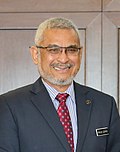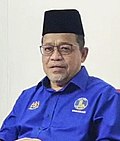| Portrait | Name
(Birth–Death)
Constituency | Political Party | Title | Took office | Left office | Prime Minister
(Cabinet) |
|---|
| | Hassan Adli Arshad
(1929-1987)
MP for Bagan Datok | BN (UMNO) | Minister of Local Government and Federal Territories | 1976 | 1978 | Hussein Onn
(I) |
|---|
| | Hussein Onn
(1922-1990)
MP for Sri Gading | Minister of Federal Territories | 1978 | 1980 | Hussein Onn
(II) |
|---|
|  | Abdul Taib Mahmud
(1936-2024)
MP for Samarahan | BN (PBB) | 1980 | 9 March 1981 |
|---|
| | Sulaiman Daud
(1933-2010)
MP for Santubong | 9 March 1981 | 17 July 1981 |
|---|
|
|---|
| | Mohd Isa Abdul Samad
(b. 1949)
MP for Jempol | BN (UMNO) | Minister of Federal Territories | 27 March 2004 | 16 October 2005 | Abdullah Ahmad Badawi
(II) |
|---|
|  | Shahrizat Abdul Jalil
(b. 1953)
MP for Lembah Pantai
Acting | 16 October 2005 | 14 February 2006 |
|---|
|  | Zulhasnan Rafique
(b. 1954)
MP for Setiawangsa | 14 February 2006 | 9 April 2009 | Abdullah Ahmad Badawi
(II • III) |
|---|
| | Raja Nong Chik
(b. 1953)
Senator | Minister of Federal Territories and Urban Wellbeing | 10 April 2009 | 16 May 2013 | Najib Razak
(I) |
|---|
|  | Tengku Adnan Tengku Mansor
(b. 1950)
MP for Putrajaya | Minister of Federal Territories | 16 May 2013 | 9 May 2018 | Najib Razak
(II) |
|---|
|  | Khalid Abdul Samad
(b. 1957)
MP for Shah Alam | PH (AMANAH) | 2 July 2018 | 24 February 2020 | Mahathir Mohamad
(VII) |
|---|
|  | Annuar Musa
(b. 1956)
MP for Ketereh | BN (UMNO) | 10 March 2020 | 16 August 2021 | Muhyiddin Yassin
(I) |
|---|
|  | Shahidan Kassim
(b. 1951)
MP for Arau | 30 August 2021 | 24 November 2022 | Ismail Sabri Yaakob
(I) |
|---|
|  | Zaliha Mustafa
(b. 1964)
MP for Sekijang | PH (PKR) | Minister in the Prime Minister's Department (Federal Territories) | 12 December 2023 | 17 December 2025 | Anwar Ibrahim
(I) |
|---|
|  | Hannah Yeoh Tseow Suan
(b.1979)
MP for Segambut | PH (DAP) | 17 December 2025 | Incumbent |
|---|










